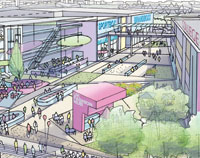It’s been one of Boris Johnson’s favourite gags of recent years: London’s preparations to host the 2012 Olympics have been so advanced, we should be calling a snap Olympics.
Deloitte chief executive David Sproul, one of the Games’ key sponsors, joined in this week, saying London could do a pretty good job of hosting the Games were they to start this month. Indeed, the last major unfinished venue – the 17,500 capacity aquatics centre – is expected to be completed on 19 July.
It’s a major success story that isn’t – and can’t be – told often enough. The venues are being delivered ahead of schedule and, according to new figures from the Olympic Delivery Authority, under budget (p46).
The ODA accounts for the year to 31 March 2011 show the anticipated final cost of the build programme is now £55m below its £7.3bn budget, and well under the original £8.1bn of funding set aside for the Games’ venues and infrastructure.
With 377 days to go until the self-styled greatest show on Earth begins, the attention will rightly turn to legacy. It’s been a focus for EG over the past two years, and we will continue to examine commitments and delivery. And this week our Olympics’ correspondent Nick Whitten reveals a major breakthrough (p23).
Most of those closely involved in delivering the legacy acknowledge one asset presents a particular challenge: the International Broadcasting Centre and Main Press Centre, at the Hackney Wick end of the Olympic Park. The centre has, at various times, been touted as a potential broadcast home for the BBC and ITV – proposals that were seen as misguided.
Earlier this year, we revealed an audacious bid to turn it into a snowdome. It was a seductive offer, but one that faced an insurmountable hurdle: it failed to deliver on key legacy commitments, not least to create significant employment opportunities in one of the poorest areas in London.
Now, however, a credible bid has emerged. It delivers on the commitment and achieves an ambition long-cherished by Hackney mayor Jules Pipe for a “home for creative industries in legacy”.
The proposal is for a UK Fashion Hub that unites four key areas under one roof: education, commerce, technology and manufacturing. It will deliver employment and training. And it will do so for an industry in which the UK – and London in particular – is a world leader.
According to a UK Fashion Council report published last year, the direct value of the fashion industry to the UK economy is £21bn – or £37bn if you include “spill over” effects ranging from IT to tourism.
The industry employs 816,000 people. Its impact on the London economy is also proven: London fashion week makes £20m a year for the capital, and draws in orders of £100m.
It’s not a done deal. But the proposal chimes with the local authority’s vision, meets the Olympic Park Legacy Company’s objectives and ticks central government boxes too.
He may be sidetracked by other events right now, but the prime minister has championed East London as a new creative quarter following the Games.
Should the bid be accepted, the knock-on effects will be closely watched. The Wellcome Trust has submitted a bid for the entire park, but made it contingent on getting the Olympic Village. Its bid – at £1bn – is seen as cheap, and with no pressure to shift a troublesome asset, it is easier to reject. That perhaps strengthens the hands of rival village bidders Hutchison Whampoa and a Qatari Diar/Delancey joint venture.
The plan is coming together.











